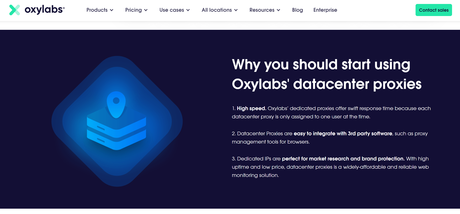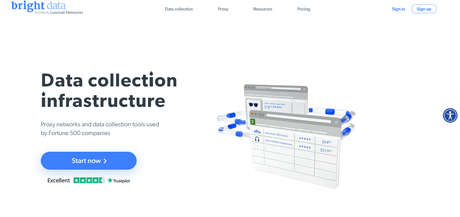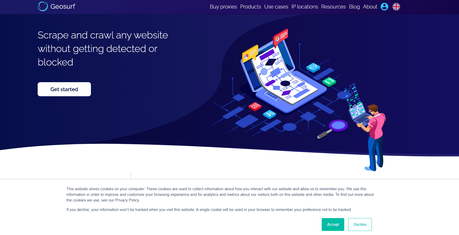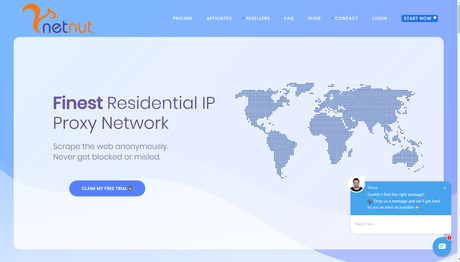Smartproxy is a global proxy service that specializes in data center and residential proxies, as well as a variety of additional online scraping solutions. It began operations in 2018 and has immediately absorbed a sizable portion of the proxy market.
Bright Data is a premium proxy service based in Israel that was founded in 2014. It was once known as Luminati.
NetNut is a premium proxy service based in Israel. It was founded in 2017. It was eventually bought by the Safe-T group, a cybersecurity business.
A Canada proxy server enables you to access the Internet using a Canadian IP address. This enables you to access localized content and surf the web as if you were in Canada.
Proxies from Canada are ideal for site scraping and market research initiatives, as well as for purchasing retail products at local costs. The following are the best Canada proxy providers available today.
Best Canada Rotating Data Center Proxies in 2022
1. Smartproxy:

Smartproxy is a global proxy service that specializes in data center and residential proxies, as well as a variety of additional online scraping solutions. It began operations in 2018 and has immediately absorbed a sizable portion of the proxy market.
Smartproxy is now the third biggest proxy service. And it is rapidly gaining ground on the market's two leaders: Bright Data and Oxylabs.
What factors contributed to its success? I think that multiple variables are at work.
A significant aspect is placement. It's no secret that Bright Data and Oxylabs are enterprise-focused. This created a significant market vacuum, with several tiny proxy providers fighting for less lucrative but desirable consumers.
When Smartproxy launched, it was completely focused on this sort of customer and soon swept up a large number of sneakerheads, Instagram hustlers, and small-time scrapers.
Of course, this is insufficient on its own. What set Smartproxy apart was its unmatched blend of functionality and pricing. The company was able to deliver a comparable level of service to its premium rivals while making rates more affordable and accessible.
Certain concessions had to be made. There are fewer sophisticated capabilities available, and there are fewer IP types to pick from. However, Smartproxy's value proposition as a whole is rather good. As a result, we named it the Best Value Provider.
I may be exaggerating my accolades for the firm, but I am certain that they are well-deserved. After all, the market is the ultimate arbiter, and it seems to like Smartproxy. I wouldn't be shocked if some managers at huge corporations are patting themselves on the head for their hidden discovery.
2. Oxylabs:

Oxylabs is a Lithuanian proxy service provider that has been in operation since 2015. Every aspect of it screams professionalism. From a neat and clean website to a main listing of qualifications, to a dedicated account manager. Indeed, its goods are insured, which is a first for a proxy provider.
You'll struggle to discover any of the standard proxy targets here, such as footwear, Instagram, or Twitter. I'm sure the organization would be pleased to accommodate these use cases (if your requirements are sufficiently large), but they don't seem to be the primary emphasis.
Rather than that, you'll read about ad verification, brand protection, market research, and business intelligence - or, as I previously said, business. In a nutshell, Oxylabs markets itself as a proxy service with a connection.
Is it a terrible thing? Given the company's position as the second biggest participant in the proxy business - and its continued growth - I would argue the contrary. Having a defined focus enables you to provide the appropriate features to the appropriate clients.
I believe it's all about expectations: If you fit the target demographic, you can be certain you'll get the service you need.
Reliable proxies, service level agreements, and enterprise-level support? You have it. Or rather a gadget that scrapes for you? There is a tool for it called Real-Time Crawler. While you may spend somewhat more, exceptional service comes at a cost, and Oxylabs delivers.
Oxylabs provides dedicated data center proxies, static and rotating residential proxies, and a data retrieval tool. Each tool is designed to address a certain set of requirements.
Oxylabs' datacenter proxy network is comprised of fast and reliable IP addresses allocated to your exclusive usage from cloud hosting providers. It is now the biggest pool on the market, with over 2 million IPs.
This provides a significant competitive edge when working with corporations since it enables them to grow rapidly without having to juggle several vendors.
The datacenter proxies encompass 82 sites and are not restricted in terms of destination, connection, or traffic. In other words, they're ideal for scraping high-bandwidth targets that are less protected.
Additionally, Oxylabs enables you to choose the number of subnets you require: for 1,000 IPs, you may get between four and one thousand subnets. There is no rotation, although an optional add-on called Proxy Rotator may help.
The primary product of Oxylabs is rotating residential proxies. These IPs originate from actual people's smartphones that sell traffic directly or via partner applications.
With 102 million monthly addresses, it is once again the market's biggest network. Residential IP addresses are available in hundreds of locations across the globe, and you may even filter them by ASN if necessary.
In contrast to datacenter IP addresses, residential proxies are shared and must rotate. This provides less control but simplifies proxy operation since backconnect servers are used instead of IP lists.
The rotation parameters are rather liberal: they vary from every web scraping request to every 30 minutes if you need to maintain the same IP address.
Additionally, Oxylabs provides around 100,000 static residential proxies obtained directly from ISPs. Because they do not need to rotate, such IPs are preferred for jobs requiring a stable identification. Social media account management and sneaker copping are two examples.
3. BrightData (Luminati):

BrightData is a premium proxy service based in Israel that was founded in 2014. It was once known as Luminati. However, in early 2021, it was renamed, possibly understanding the negative connections the name evoked (try Google "what is Luminati" - I challenge you).
Apart from its new moniker, Bright Data remains what it was - a market-leading proxy service provider. Few businesses are capable of confronting it squarely and for good reason.
This Israeli firm has developed a slew of services and infrastructure over the years. You will have no difficulty locating any proxy or protocol anywhere in the globe.
You'll get access to a comprehensive dashboard for configuring your proxies, as well as 24/7 customer assistance if anything goes wrong. Additionally, you may be confident that the firm services Fortune 500 companies and prestigious colleges.
Indeed, one might argue that Bright Data is beginning to outgrow proxies. It has shifted from being a proxy network to becoming a data-collecting infrastructure.
The assertion is backed up by a range of techniques that either augment or assist in the management of proxies. (One even eliminates the necessity for coding!) Indeed, we were so satisfied with the provider's infrastructure that we bestowed upon it the title of Best Proxy Ecosystem.
On a non-technical level, Bright Data has made a concerted effort to promote the collecting and use of ethical proxy data.
This has necessitated several concessions: rejecting resellers, burdening customers with an onerous KYC procedure, and restricting feasible use cases. However, it is also assisting in shedding light on the contentious proxy sector, even if this sometimes backfires.
Bright Data (Luminati) provides access to every kind of proxy network imaginable. You'll have the option of shared or dedicated datacenter IP addresses, static or rotating home proxies, or mobile IP addresses.
Bright Data's data center proxies are stacked, as one would anticipate. They're distributed around the globe, so you should have no trouble locating an IP almost anyplace.
Additionally, there are two proxy-based programs: Data Unblocker and Search Engine Crawler; both tools reliably deliver data.By default, the private datacenter proxies do not rotate, but you may configure rotation rules using Bright Data's clever proxy manager. You may narrow your search by nation or city.
If you purchase shared proxies by bandwidth, they will rotate - you will then have access to a pool of 20,000 addresses located across the world.
If you use private proxies, you must identify the domains to which you want to connect. As a result, they will not be unique to you, but rather to those few sites. Additionally, you'll be able to provide a cooling time - the number of days the IPs have been idle for that domain.
All major protocols, including SOCKS5, are provided here.
Bright Data also known as Luminati now specializes in residential proxies. The service owns the second-biggest residential proxy pool in the world, behind Oxylabs, with over 72 million IPs. Because the IPs span all nations and hundreds of localities, location targeting will not be a problem.
These proxies originate from authenticated users' desktop and mobile devices. Bright Data obtains the IPs by embedding its code inside popular programs, either intentionally or unintentionally (let's be honest - who reads terms and conditions?).
This entails the following: IP addresses change daily; Bright Data cannot guarantee their availability; the proxy pool is shared by all users. To solve the latter concern, the provider has created exclusive IPs - three to thirty home addresses reserved exclusively for your usage with a certain domain.
However, if you want exclusive access to residential proxies, there is a better option. Bright Data currently provides over 110 thousand ISP proxies - internet service provider-registered datacenter IP addresses.
They do not need to rotate and are nearly as effective at fooling websites into believing they are being accessed by a genuine person. While there are certain intricacies about earlier IP use that may result in easy suspensions, these proxies are highly regarded for sneakers and, in particular, social networking jobs.
4. GeoSurf:

GeoSurf has existed for some time. It began in 2009 as a service provided by Israeli startup BiScience to assist businesses in seeing localized material. Today, GeoSurf provides premium residential proxies and a VPN to companies, including ad verifiers, translation testers, and site scrapers.
I'm not sure about you, but I believe that ten years is a remarkable lifespan for an online firm, and it speaks volumes about the quality of its services. GeoSurf, for some reason, seems to believe differently.
It's difficult to discover anything on the website that mentions the fact: "with you since..." or anything along those lines. What marketers swoon over.
Nonetheless, there are remnants everywhere. For instance, the site has a TechCrunch testimonial. That is quite a webpage, isn't it? However, when clicking the link, you will realize that the article was published in 2011.
In some ways, this little example demonstrates a great deal about the organization as a whole. Despite entering the market far earlier than either of its primary rivals, Oxylabs or Bright Data, GeoSurf is making a concerted effort to catch up.
The supplier offers fewer IP addresses and functionality, as well as a lack of sophisticated proxy-as-a-service utilities such as Real-Time Crawler and Data Unblocker.
To make things worse, GeoSurf is also battling Bright Data in court for the right to employ residential proxies - and even the right to exist at all. In a nutshell, the provider has outlived its usefulness.
GeoSurf provides two types of residential proxies: peer-to-peer and static residential proxies. The former get IP addresses from end users' devices, whilst the latter are registered directly with home internet service providers.
GeoSurf's FAQ website also teases the possibility of mobile proxies, although they have yet to materialize.
Which IP address type should you use? Static proxies are preferable if you want the same IP address for more than 30 minutes (GeoSurf's maximum allowable rotation duration).
I'm thinking about social media management and shoes. These IPs should likewise be speedier, however, despite their designation as residential, they are more easily detected.
Rotating residential proxies are - or were - Geosurf's primary offering and the business makes a concerted effort to make them excellent. You may get 2.5 million home IP addresses; this is less than other suppliers such as Smartproxy, but it is still a good quantity.
GeoSurf's residential proxies are available in over 135 countries. More remarkable is the availability of cities: proxies are accessible in around 1,700 locales. As a result, the company is an excellent solution for geographically sensitive work.
GeoSurf promotes the IPs as clean, which means they have not been restricted or blacklisted, and limitless, which means there are no restrictions on the number of connections, threads, or locations. The only constraint you'll have is traffic, which may also be overcome by purchasing a larger plan.
Additionally, GeoSurf offers proxies optimized for Instagram and ad verification. As it turns out, they are not unique - they are identical to any other home IP address.
Over 2 million IP addresses are included in GeoSurf's network of static residential proxies. With NetNut scaling down, this pool of static IPs may be the biggest accessible today.
5. NetNut:

NetNut is a premium proxy service based in Israel. It was founded in 2017. It was eventually bought by the Safe-T group, a cybersecurity business.
NetNut provides data center and residential IP addresses for companies looking to protect their brands, gather business intelligence, steal footwear, or just scrape the web.
We could end the introduction here and proceed with the evaluation, except for one noteworthy fact: NetNut is the biggest supplier of static residential proxies.
These IP addresses are obtained directly from ISPs, not from end-users, and hence have the speed and reliability associated with datacenter IP addresses.
Simultaneously, they are as impenetrable as residential proxies - websites will treat your scraper as any average Joe from Cincinnati or wherever you want to place it.
And, although NetNut is no longer the exclusive supplier of static residential proxies, it continues to be the only one.
How? NetNut, on the other hand, makes use of the services of another firm named DiviNetworks. Divi is fundamentally a bandwidth-sharing company; however, rather than purchasing traffic from individuals, Divi purchases it from internet service providers.
This enables NetNut to get IP spaces that have a history of previous use. You may even be using them concurrently with end consumers. As a consequence, NetNut's proxies should be more difficult to block than static residential IP addresses, which often go unused.
NetNut has always catered to customers with high-volume requirements: social media marketers, search engine scrapers, and sneaker dealers. This is not the case anymore.
NetNut indicated changes in January 2022 by providing a free VPN; a month later, the company expanded its offering with datacenter and peer-to-peer home proxies. Simultaneously, it significantly broadened the price options to cover entry-level clients.
NetNut manages three proxy networks: shared datacenter IP addresses, peer-to-peer residential proxies, and its static residential proxies. NetNut also includes a proxy-based web scraping API, although it is not well-publicized.
As is customary with these proxy types, datacenter IPs are optimal for small-scale initiatives involving unprotected websites. Rotating residential proxies support a greater number of locations and are less detectable.
When a constant identity is required, static residential IPs function well with protected targets.
The most accessible service provided by NetNut is its network of data center proxies. This is a pool of 50,000 cloud hosting provider-provided shared IPs.
The cycle automatically, which makes the service particularly appealing for scraping unprotected websites; nevertheless, the service is currently only accessible in the United States.
NetNut sells around one million static residential proxies. While their number has declined somewhat over the last year, NetNut continues to be one of the leading providers of such IPs.
Static residential proxies are available in little more than 30 places, predominantly in the United States and Europe. This is sufficient for the majority of use cases; but, if you want IP addresses in Africa or smaller South American nations, we prefer NetNut's rotating residential proxies.
You may choose cities and states, but only inside the United States. Otherwise, you're left with accuracy at the national level.
Proxy servers make use of backconnect gateway servers. They are not dependent on end-users or their devices due to their static nature. Rather than that, the server may retain the same IP address continuously.
Rotation of each request is possible, but you must manually configure specific sticky sessions.
NetNut stresses the fact that their proxies are compatible with all websites, including search engines. This is a refreshing approach in an era when other providers are requiring whitelists or directing customers to specialist scraping tools (especially for Google).
If you have a certain goal in mind, you may request specialized proxies for that website from NetNut.
NetNut has long struggled with information presentation. Many of them remain unaddressed despite the provider's best efforts.
That is not to argue that NetNut lacks documentation: it has a rather comprehensive FAQ and integration instructions for popular programs.
However, if you want to learn if non-resellers may establish sub-users, how to target cities, how the residential IPs are rotated, or how the scraping API works, you'll either have to delve deep or give up and contact NetNut directly. This might be aggravating at times.
Having said that, NetNut seems to have finally begun focusing on user experience, so perhaps this trend will continue.
FAQs related to Best Canada Proxies
Conclusion- Best Canada Proxies In 2022
Quick LinksWe hope you found what you were looking for. Please let us know in the comment section which one out of these you chose and why.

